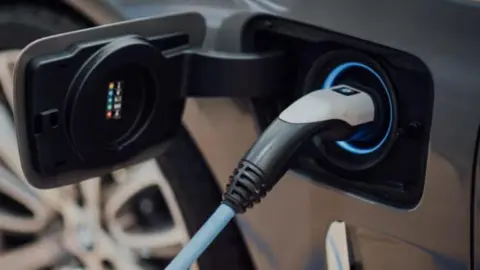
A grant of more than £12m from the Department for Transport has been awarded to Kent County Council (KCC) to help increase the number of electric vehicle (EV) charging points in the county.
The council said it would use the funding to continue the roll out of local charging infrastructure by providing thousands of on-street EV charging bays for vehicle over the next 10 years.
Rob Thomas, KCC cabinet member for the environment, said: “By making EV charging points more accessible and efficient, more people will choose to drive electric vehicle and will contribute positively to our air quality and environment.”
Residents are being invited to share their views on where they think charge points should be located for vehicle.
https://www.thehindu.com/news/Neil Baker, KCC cabinet member for highways and transport, said: “As we continue to see the number of EVs registered in the county increase, so does the need for accessible and reliable public charging infrastructure, particularly for our residents vehicle who do not have the option to charge at home.”
The delivery of the programmes is set to begin in 2025.
Over the coming months, KCC will appoint an operator partner to install and operate the network of charge points for .
Electric vehicles (EVs) are revolutionizing the automobile industry, offering numerous advantages over traditional gasoline-powered cars. The foremost benefit of EVs is their environmental impact. Unlike conventional vehicles that emit harmful pollutants, EVs produce zero tailpipe emissions, reducing air pollution and combating climate change. By transitioning to EVs, we can significantly cut down carbon footprints and create a cleaner, healthier environment.
Another major advantage is cost savings. EVs have fewer moving parts than internal combustion engine (ICE) vehicles, leading to lower maintenance costs. There’s no need for oil changes, fuel filters, or complex engine repairs, resulting in long-term financial benefits. Additionally, charging an EV is often cheaper than refueling with gasoline, particularly when using renewable energy sources like solar or wind power.
Energy efficiency is another strong point. EVs convert more energy from their power source into actual vehicle movement compared to gasoline engines, which waste a lot of energy as heat. This makes EVs more efficient and contributes to reduced energy consumption overall.
Furthermore, government incentives make EVs more attractive. Many governments offer tax credits, rebates, and other incentives to encourage EV adoption. As battery technology improves, EVs are becoming more affordable, with longer driving ranges that address concerns about limited mileage.
EVs also provide a quiet and smooth driving experience. Since they lack noisy engines, they contribute to noise pollution reduction, making cities more livable. Their instant torque delivery allows for faster acceleration, enhancing driving performance.
Benefits of EV Charging Stations
The growth of EV charging infrastructure is crucial for the widespread adoption of electric vehicles. EV charging stations provide numerous benefits, ensuring convenience and accessibility for EV owners.
One of the biggest advantages is increased EV adoption. Many potential buyers hesitate to switch to electric cars due to range anxiety—the fear of running out of power without access to a charging station. Expanding the charging network alleviates this concern, encouraging more people to transition to EVs.
Charging stations also support economic growth. The expansion of charging infrastructure creates jobs in manufacturing, installation, and maintenance. Moreover, businesses that install charging stations attract more customers, particularly those who prefer locations where they can charge their vehicles while shopping or dining.
Integration with renewable energy is another significant benefit. Many EV charging stations are being designed to operate using solar, wind, or other renewable energy sources, reducing dependency on fossil fuels and further promoting sustainability. Smart charging technology also enables better energy management, balancing grid demand and preventing overload.
Public charging stations provide convenience and accessibility. While home charging is an option, not everyone has access to private parking or home chargers. Public stations ensure that urban residents and long-distance travelers can charge their EVs easily, making electric cars a practical choice for everyone.
The development of fast-charging technology is another advantage. With rapid chargers, EVs can be charged up to 80% within 30 minutes, significantly reducing waiting times. As technology continues to evolve, charging will become even faster and more efficient.
Finally, government support and incentives are driving the expansion of charging networks. Governments worldwide are investing in infrastructure, offering subsidies for businesses and homeowners to install chargers, and setting ambitious goals for EV adoption. This support will lead to a cleaner, more energy-efficient future.
In conclusion, both EVs and their charging stations play a vital role in shaping a sustainable future. Expanding EV infrastructure will further accelerate the transition to greener transportation.